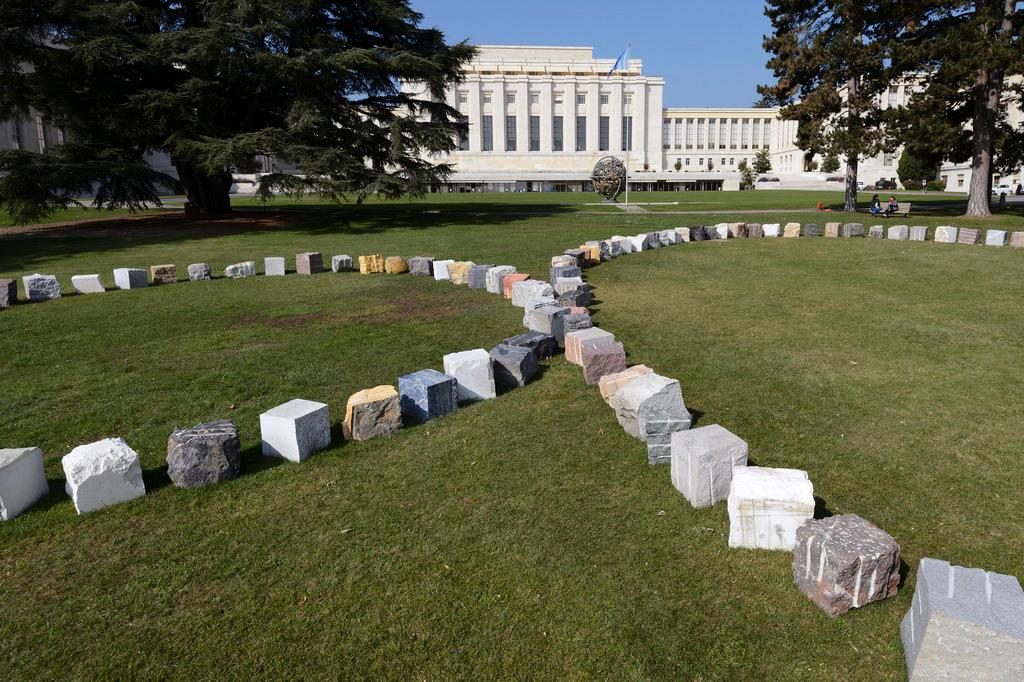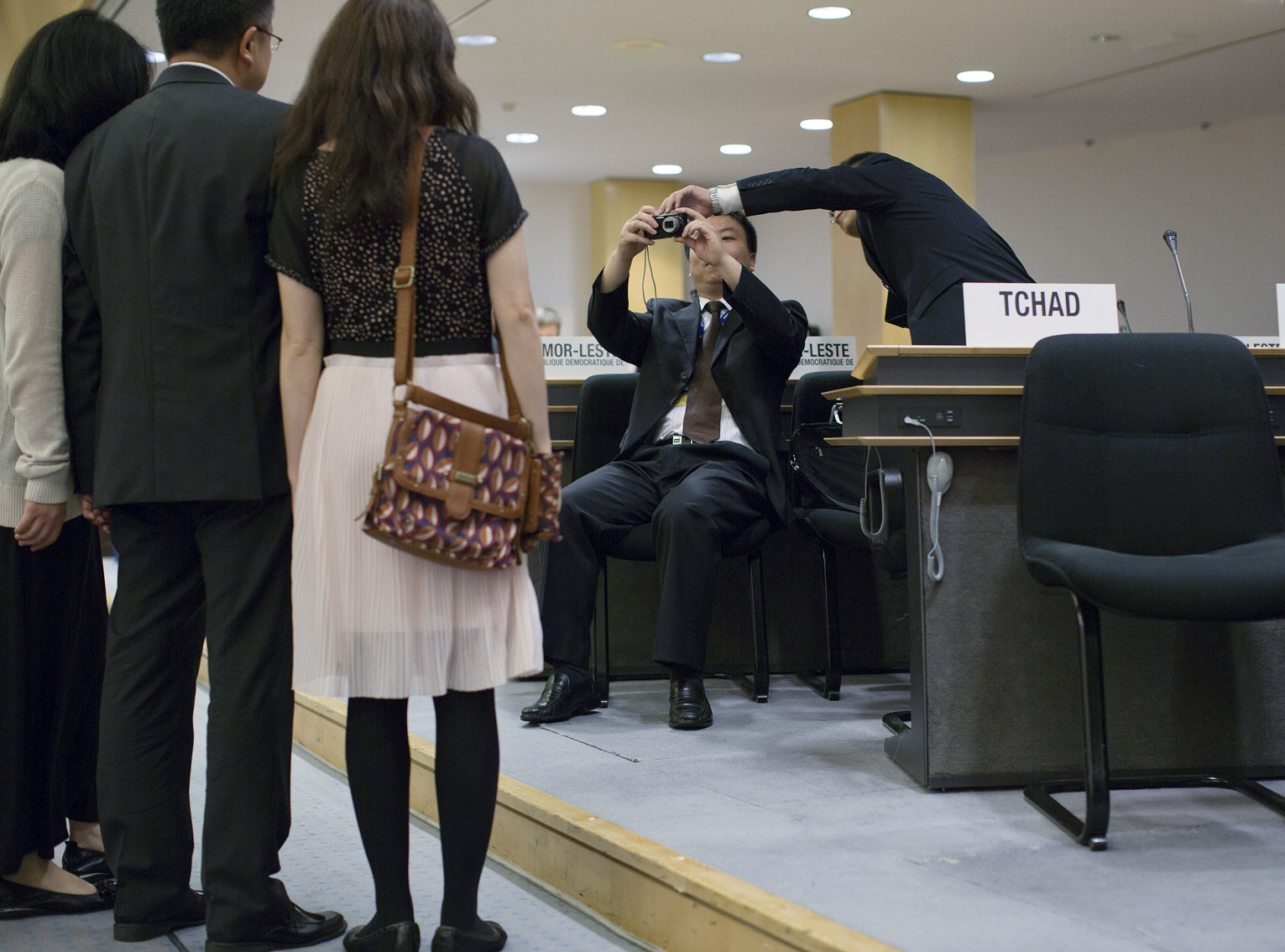
The UN turns 70: Is it fit for purpose?

The United Nations is marking its 70th anniversary this autumn. swissinfo.ch asked some of the biggest UN players in Geneva if the organisation is ready for the 21st century.
Enumerating the UN’s achievements since it was founded in 1945 is arguably a long, difficult task. UN Secretary-General Ban Ki-Moon recently had a go at a shortish list: “Every day the UN makes a positive difference for millions of people: vaccinating children, distributing food aid, sheltering refugees, deploying peacekeepers, protecting the environment, seeking the peaceful resolution of disputes and supporting democratic elections, gender equality, human rights and rule of law.”
On October 24, members of the public were invited to reflect on its accomplishments at an open day at the UN Palais des Nations complex in Geneva. Around 18,000 people attended. One of the highlights was the unveiling of a new sculpture in the nearby Ariana Park. “The Rebirth”External link is composed of 193 large stones – one for each member state – set in an infinity configuration and supposedly symbolises a ‘new start’ for the UN.
“After 70 years the organisation must change and reform in order to better reply to the realities of today’s world,” said Michael Moller, director-general of the UN Office at Geneva, which is home the largest concentration of UN personnel in the world.
Archaic structure
Hailed as the great hope for the future of humankind after the Second World War, the UN has struggled to adapt. Its governing body, the Security Council, still reflects that post-war world with the victors – China, France, Russia, the UK and US – still the only permanent members with veto powers. Critics say paralysis has led to failures in dealing with crises like the wars in Syria and Ukraine.
Former Secretary-General Kofi Annan recently declared that the council must take in new permanent members or risk becoming increasingly irrelevant on the international stage. Yet there are few signs members want to give up any power or share it.
Switzerland has been pushing for reforms of the council since it joined the UN in 2002. It coordinates a group of 27 small and mid-sized countries, known as the Accountability, Coherence and Transparency Group (ACT). Its new initiative, backed by 60 countries, urges permanent and non-permanent council members to waive their veto to block resolutions aimed at preventing or ending cases of mass atrocities.
Alexander Fasel, the Swiss ambassador to the UN in Geneva, believes small progress is possible.
“There are improvements in the working methods of the council, especially the open sessions and states are making efforts to be transparent. With the veto initiative, the idea is slowly being accepted. Even member states like France back it,” he told swissinfo.ch.
Growing demands
While its most powerful political body is still stuck in 1945, at operational level the UN has expanded massively due to increasing demands. It now has a staff of 85,000 and an annual spend of about $40 billion (CHF38.2 billion), which has quadrupled in the past 20 years. At the same time, raising money is a constant problem, hindered by severe competition between agencies.

More
Behind the scenes in Geneva
The UN is now a huge system with 20 specialised agencies, each with its own budget and assembly. Yet there is no central authority to oversee them all.
The heavy structure was recently blamed for the World Health Organisation’s delay in recognizing the Ebola epidemic.
“I don’t think it’s become too big but [rather] too fragmented,” said Moller. “It’s extraordinarily difficult to manage properly, whether it be recruitment or purchasing. Every practical aspect of managing an organisation of this size is hampered by the UN rules imposed by member states.”
2015 is a critical year for the UN system, which will define much of its work for the coming years. In March, a new disaster risk reduction framework was agreed. In September, the UN General Assembly approved a new development agenda designed to end poverty and hunger by 2030, and hopes are high that nations will reach a new agreement in Paris in December to tackle climate change.
Up to the task?
Ian Richards, president of the Coordinating Committee of International Staff Unions and AssociationsExternal link (CCISUA), representing 60,000 UN staff, is not sure the UN is suitably prepared to handle all these new goals.
He says the UN suffers from chronic structural problems: too scared of failure, too old (average age for joining is 41) and too bureaucratic. He feels the General Assembly micromanages too many policies and budgets, and competing interests between states complicates recruitment.
“Whenever agencies downsize, they cut the lower posts and when they expand they add people to the top level, like directors and their deputies. Member states want to get their own senior people in. And agencies say, ‘we need mid-career experts, not junior staff we need to train’,” said the Geneva-based official.
To function properly the UN relies on armies of interns and external consultants on short-term contracts, who can represent up to 40% of staff in some organisations, he added.
Reforms
Ten years ago at a summit that marked the UN’s 60th anniversary, world leaders agreed on a watered-down document to overhaul the UN. A decade ago, a report by a High Level Panel on UN Reform looking at development, humanitarian assistance and the environment also criticised the UN for badly failing those it was meant to help.
Their report suggested many changes to promote teamwork and efficiency in the field under a scheme called Delivering as OneExternal link – bringing together agencies under a single country office, programme, budget and leader – launched as a pilot in eight countries in 2007. What would the panel say now?
Ambassador Fasel felt Delivering as One had led to considerable reforms.
“The UN is a learning organisation. It’s a system that knows how to take stock, reflect on its working methods and correct itself,” he said.
Moller also felt “tremendous” improvements had been made to field operations, especially in developing nations. But progress was “asymmetrical”, depending on who was in charge. Broader reforms are still needed, he insisted.
“Over the past 10-15 years our understanding of the complexities of the problems we face is much more sophisticated but the structures haven’t followed suit. If we lived in a perfect world, we would have already had a serious restructuring. Unfortunately, right now the political will among member states is not there. And of course this would cost money so it’s unlikely to happen soon,” said the head of the UN office in Geneva.
International Geneva
Geneva is home to the headquarters of 33 international organisations, such as the World Health Organization, the World Meteorological Organization, the Office of the UN High Commissioner for Refugees and the International Committee of the Red Cross.
In all, some 29,000 international diplomats and civil servants are based in Geneva; in addition, there are around 2,400 staff working for 250 non-governmental organisations. Around 9,400 staff work for the United Nations family in Geneva, which is the largest concentration of UN personnel in the world. There are also 173 states represented in Geneva.
Annually, Geneva welcomes 200,000 people taking part in 2,700 international conferences and meetings, more than New York. In addition, there are 3,000 professional and private visits by heads of state, government and ministers. Some 900+ multinationals are also registered in Geneva, providing over 76,000 jobs. In 2013 the international organisations’ and institutions’ expenditure amounted to CHF5.45 billion.
In the UN world, October 24 is referred to as UN Day, marking the anniversary of the entry into force in 1945 of the UN Charter. This year’s anniversary is being celebrated under the slogan ‘Strong UN-Better World’.

In compliance with the JTI standards
More: SWI swissinfo.ch certified by the Journalism Trust Initiative































You can find an overview of ongoing debates with our journalists here . Please join us!
If you want to start a conversation about a topic raised in this article or want to report factual errors, email us at english@swissinfo.ch.